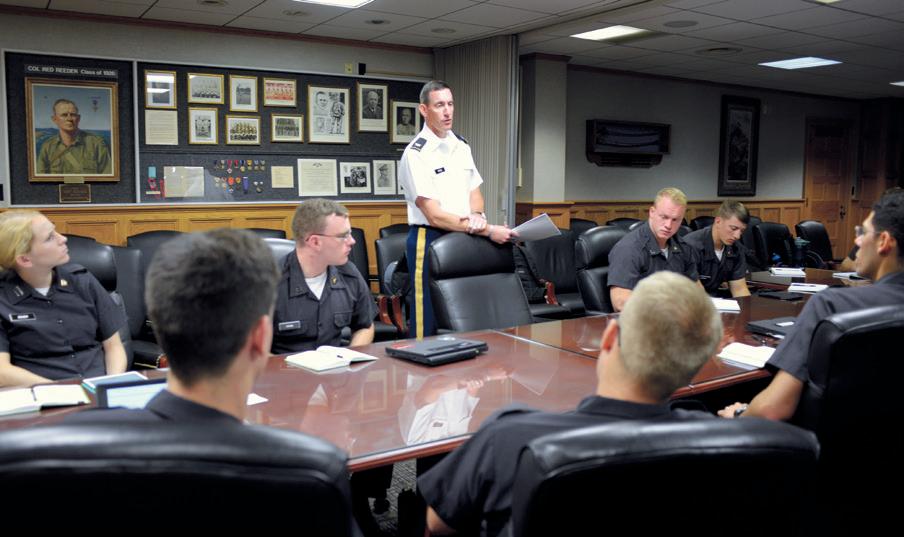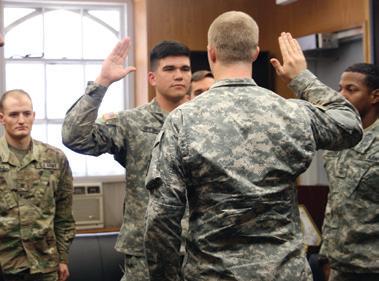
4 minute read
Integrating the Four Pillars with MX400: Officership, the Superintendent’s Capstone Course
By Kim McDermott
Since 2008, every First Class cadet has taken the Superintendent’s capstone leadership course called Officership (MX400). MX400 is designed to complete a cadet’s transition from a cadet identity to an officer identity. What originated as a 2.0 credit hour professional seminar will become a 3.0 credit course in the Academic Program starting with the Class of 2019. As an integrative course, MX400 draws upon instruction from all four developmental pillars (academic, military, physical, character). As an interdisciplinary course, MX400 requires cadets to apply learning from other courses across the core curriculum to solve complex problems they will likely face as graduates. In addition to the integrative and interdisciplinary approach, MX400 introduces cadets to Army doctrine for the Army Profession and Mission Command.
Advertisement
MX400 is the brainchild of General Frederick Franks ’59 (Retired), who holds the Class of 1966 Chair for the Professional Military Ethic (an endowed faculty chair). In 2005, he proposed a prototype of MX400 modeled after a Battle Command elective he was teaching to First Class cadets. His idea became reality in 2008 when MX400 became a graduation requirement in the Military Program. The impetus for the idea was to create an opportunity for cadets to reflect upon their West Point experience and how that experience prepared them for the rigors of officership. Since its introduction in 2008, MX400’s vision has been to develop in each cadet a self-concept of officership. To meet that vision as well as the standards of an Academy core curriculum course, over time the course has evolved into an academically rigorous study of officership.
PhD
MX400 brings the challenges of officership to life by using Jim Frederick’s 2010 nonfiction book Black Hearts: One Platoon’s Descent into Madness in Iraq’s Triangle of Death as a semester-long case study. Black Hearts is a gut-wrenching account of the consequences of poor officership. Through studying this dramatic historical account, cadets are able to imagine themselves facing similar leadership challenges in today’s operating environment. Although its use has been somewhat controversial, Black Hearts has proven to be an eye-opener to many cadets about the importance and gravity of their upcoming responsibilities.
MX400 requires cadets to practice interdisciplinary problem solving with an integrative challenge. Teams of four are presented with several ambiguous leadership scenarios based on Black Hearts. The cadet teams must develop a written and oral response that requires creative problem solving, critical thinking, and application of material learned in other classes and programs. For example, a single scenario can draw upon leadership theory (Academic Program), soldier health and fitness (Physical Program), tactical expertise (Military Program), and ethical decision making (Character Program). Cadets negotiate problem solving both as teams and individuals, challenging themselves and others through a purposeful, structured reflective exercise—while drawing from all they’ve learned during their 47-month experience.
Lieutenant Colonel Charlie Faint from the Simon Center for the Professional Military Ethic (SCPME) is the MX400 course director, responsible for MX400 planning and implementation.
Colonel Scott Halstead ’91 (SCPME Director), Lieutenant Colonel Dan Gade ’97 (Deputy MX400 Course Director), Lieutenant Colonel Dave Jones ’85 (Retired) (Hottell Chair for Character Development) and Colonel Jeff Peterson ’87 (Retired) (Class of 1969 Chair for the Study of Officership) also teach sections of MX400 as their only teaching requirement. The rest of the MX400 faculty are volunteers from other academic departments and the United States Corps of Cadets staff. Without these volunteers, who teach MX400 in addition to their normal teaching and workload, MX400 could not be taught to every First Class cadet. There is a conscious effort to teach in pairs, providing more than one perspective, as well as ensuring that the volunteer coverage works out.
Using volunteer faculty has been a policy decision with pros and cons. The two primary benefits are that the faculty want to teach, and they can provide a broad perspective to the instruction— pulling from their respective disciplines. A major challenge relates to faculty recruiting and development. Of course, there is a finite amount of time available for any faculty member, and when there are time constraints, MX400 can suffer. Without adequate preparation time, there is the potential for volunteer faculty to revert back to “Platoon Leader 101” at the expense of the true study of officership in a manner that justifies inclusion in the Academic Program. Peterson believes that the course may remain at a plateau until faculty are designated who teach MX400 as their primary teaching responsibility.
As part of the interdisciplinary nature of MX400, Dr. Peterson supports workshops for the instructors teaching courses in the same threads as MX400. Threads are core courses grouped together because the course contents contribute to a comprehensive understanding of a subject germane to developing leaders of character. A few examples are: Culture/Region, Gender/Sexuality/ Respect (GSR), and Military Profession.
Dr. Greta Bucher (Department of History) says a recent GSR workshop provided a forum for the instructors to “hear what the other courses in the thread do with regards to GSR and discuss the concepts in small groups to gain insight into the different disciplinary approaches and perspectives.” She adds, “MX400 can leverage the different disciplinary perspectives on GSR that have been a part of the cadets’ education over their first three years and help them to understand how these concepts apply to their real-life situation as officers.” She also hopes that the forum will “inspire an ongoing cross-disciplinary discussion among instructors that will broaden their understanding of GSR with respect both to teaching and scholarship.”
To prepare for the transition to a core course, the Academy is already treating MX400 as a bonafide academic course (including assessment/evaluation). The integrative nature of the program is in keeping with broader interdisciplinary trends in higher education. And ultimately, when all the pieces come together, cadet performance in MX400 may become an effective indicator of success for the overarching Academic Program Goal of the new curriculum: Graduates integrate knowledge and skills from a variety of disciplines to anticipate and respond appropriately to opportunities and challenges in a changing world.







